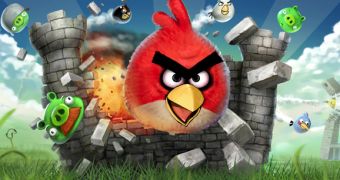Mobile gaming is currently dominated by Angry Birds, Rovio's addictive physics-based puzzle game that appeared on the iPhone/iPod Touch/iPad market, as well as the Android and Nokia platforms.
Now, SF Weekly magazine decided to find out just why is the game so addictive, and asked specialists in the field about the mobile title.
[admark=1]According to Seppo Helava, the co-founder of Self Aware Games, the cartoon-like graphics draws people in, while the slot machine-like nature of the gameplay, with an emphasis on trial and error, keeps people playing it.
The repetitive motion in a slot machine doesn't have a pattern, but in Angry Birds you can actually impact the result.
"Whereas with the slot machines there's no pattern, in Angry Birds there is — but it's very hard to figure out," says Helava. In order to figure it out, players need to "pull the trigger over and over again."
A psychology professor, Mel Joseph Ciena, also chimed in, taking on both Angry Birds but also gaming as a whole, which, he says, creates an illusion of achieving something for the players.
"It gives you the false impression you're competitive and achieving something, but, really, you're achieving at things that are relatively safe and anonymous," he says.
"It becomes addictive because you get the false impression you are improving as a person. But you are improving at the wrong thing — you're just becoming an expert at a game."
As you can see, professor Ciena isn't exactly the most impartial of sources.
Still, his observations hasn't stopped Angry Birds from becoming a worldwide phenomenon, and gaming as a whole will continue to become even more important in the realm of entertainment.
As of right now, Angry Birds is available as a paid download for the iOS platform, specifically the iPhone, iPod Touch and iPad, and as an ad-supported version on the Android and Nokia platforms.

 14 DAY TRIAL //
14 DAY TRIAL //